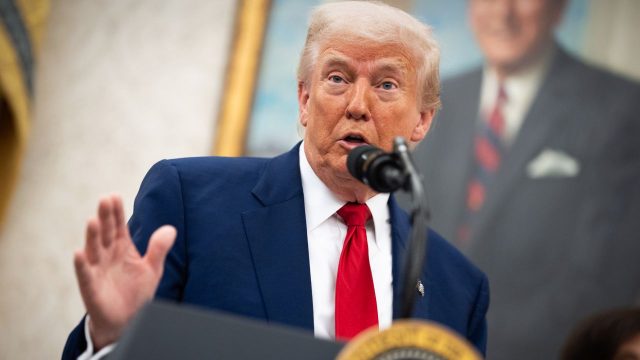
Republicans face a pair of existential threats as they look ahead to next year’s midterms, said Chris Brennan in USA Today. The first is the economy. In exit polls from last week’s off-year elections—where Republicans suffered a “thorough thrashing”—voters cited the economy and cost of living as their top concerns. And in a Washington Post/ABC News poll taken just before the elections, 71% of Americans said they were spending more on groceries than a year ago, with 59% blaming Trump for rising prices. Republicans’ second threat is that Trump “refuses to admit there is a problem.” Instead of asking for voters’ patience, Trump this week dismissed the affordability crisis as a “con job by Democrats,” insisting that prices are “down,” and that polls showing Americans’ economic worries are “fake.” Of all people, Trump should know the folly of this denialism, said the New York Post in an editorial. By refusing to acknowledge the economic “struggles of regular Americans,” Trump is “making the same mistake as his archnemesis,” former president Joe Biden, and risks dooming his party to the same electoral fate.
There are signs that Trump recognizes he hasn’t “won the affordability battle,” said Megan Messerly and Myah Ward in Politico. In recent days, the White House has “announced a bevy of policies” that, if enacted, “may ease the pressure on household budgets.” They include plans to send Americans $2,000 tariff “dividend” checks, a reduction in tariffs on coffee, bananas, and other foods, and an investigation into beef producers for price gouging. Trump’s exasperation with public sentiment actually has some foundation, said Matthew Yglesias in Slow Boring. While the price of most products is indeed still rising—annualized inflation was 3% in September, down from a 9.1% peak in 2022—incomes have risen faster than prices over the past five years, and “it’s not actually true that people are less able to afford things than they were in the past.”
But politics is about perception, said Ben Berkowitz and Marc Caputo in Axios, and Trump, on top of everything, has a terrible “optics problem.” When voters, rightly or wrongly, feel that they’re struggling to make ends meet, it’s political insanity for the president to be “jet-setting all over the world,” throwing Great Gatsby–themed parties at his Florida estate, and demoing the White House to build a $300 million gilded ballroom. Trump’s affordability messaging isn’t just out of touch, said Eric Boehm in Reason, it’s also “inept.” If, as Trump posted last week, “Our Economy is BOOMING, and Costs are coming way down,” then why do we need relief checks? And what does it say when payments for struggling Americans are funded via the price-raising tariffs we were told would make all of us “wealthier than ever?”
We are in a dangerous moment, said Jeffrey Blehar in National Review. The affordability crisis has hit young people especially hard, and many believe the American dream—“a spouse, a house, the comforts of modern domesticity”—is now priced beyond reach. That economic discontent caused young voters to swing to Trump last year. But all he has offered them so far are gimmicks, like a 50-year mortgage that will lock them in “long-term debt slavery.” Angry and disillusioned, young Americans are increasingly embracing socialism on the Left and nihilistic nationalism on the Right. If Trump leaves “the younger generation as destitute of future prospects as when he retook office,” their fury will only grow. “Trump is in his final term; perhaps he might not care. You should.”
Trump ‘refuses to admit there is a problem’




